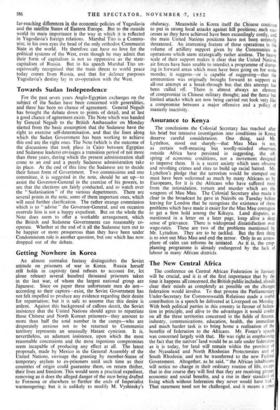Getting Nowhere in Korea
An almost surrealist fantasy distinguishes the Soviet attitude on prisoners of war in Korea. Russia herself still holds in captivity (and refuses to account for, let alone release) several hundred thousand prisoners taken in the last war, of whom the largest national group are Japanese. Since on paper these unfortunate men do not— according to their captors—exist, the Soviet Government has not felt impelled to produce any evidence regarding their desire for repatriation; but it is safe to assume that this desire is ardent. Against this background of callous deceit, the Soviet insistence that the United Nations should agree to repatriate those Chinese and North Korean prisoners—they amount to more than half the total number in the camps—who are desperately anxious not to be returned to Communist territory represents an unusually blatant cynicism. It is, nevertheless, an adamant insistence, upon which the most reasonable concessions and the most ingenious compromises seem incapable of producing any effect at all. The latest proposals, made by Mexico in the General Assembly of the United Nations, envisage the granting by member-States of temporary asylum to ex-prisoners until such time as their countries of origin could guarantee them, on return thither, their lives and freedom. This would seem a practical expedient, removing as it does the alleged danger of the men being drafted to Formosa or elsewhere to further the ends of Imperialist warmongering; but it is unlikely to modify M. Vyshinsky's obduracy. Meanwhile in Korea itself the Chinese continue to put in strong local attacks against hill positions; such suc- cesses as they have achieved have been exceedingly costly, and the main United NatiOns positions have not been seriously threatened. An interesting feature of these operations is the volume of artillery support given by the Communists to operations which seem strategically rather aimless. The heavy scale of their support makes it clear that the United Nations air forces have been unable to interdict a programme of dump- ing in forward areas which must have been going on for some months; it suggests—or is capable of suggesting—that the ammunition was originally brought forward to support an all-out attempt at a break-through but that this attempt has been vaned • Dff. There is almost always an element of, compromise in Chinese military thought; and the fierce but limited attacks which are now being carried out look very like a compromise between a major offensive and a policy of masterly inactivity.


































 Previous page
Previous page